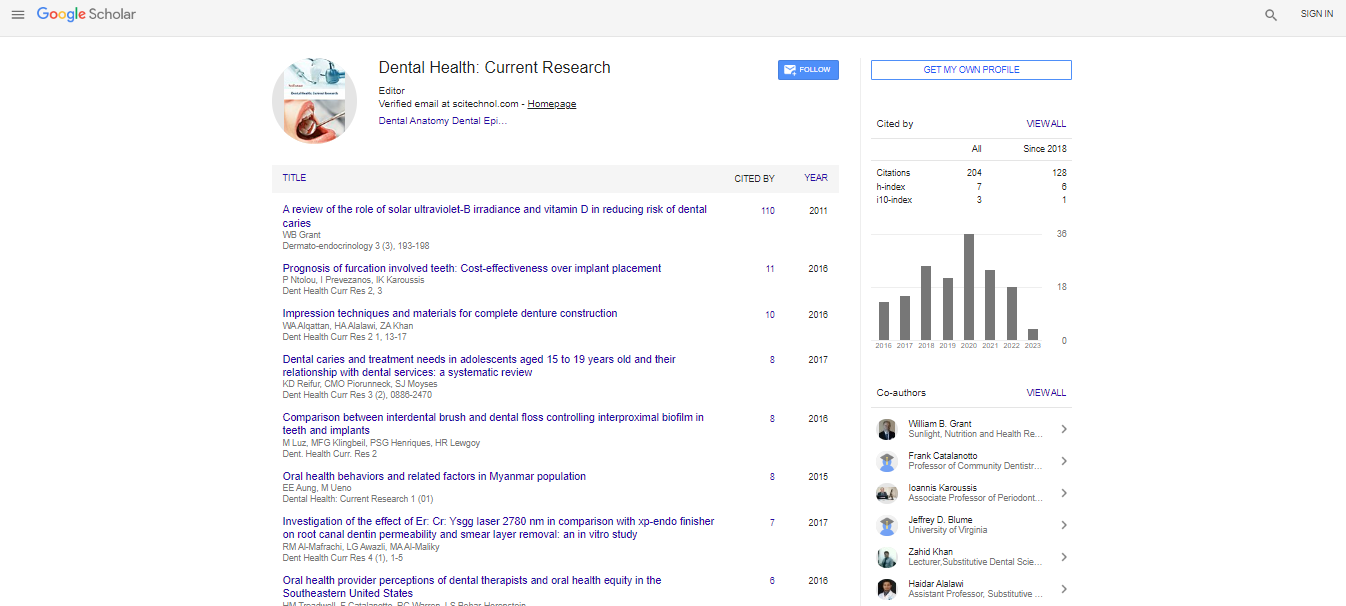Commentary, Dent Health Curr Res Vol: 9 Issue: 3
The Function of Dental Surgery in the Management of Oral Diseases and Conditions
Orsolya Nemeth*
1Department of Community Dentistry, Semmelweis University, Hungary, Hungary
*Corresponding Author: Orsolya Nemeth,
Department of Community Dentistry,
Semmelweis University, Hungary, Hungary
E-mail: nemetho@546gmail.com
Received date: 29 May, 2023, Manuscript No. DHCR-23-104184;
Editor assigned date: 31 May, 2023, PreQC No. DHCR-23-104184 (PQ);
Reviewed date: 14 June, 2023, QC No. DHCR-23-104184;
Revised date: 21 June, 2023, Manuscript No. DHCR-23-104184 (R);
Published date: 28 June, 2023, DOI: 10.4172/2470-0886.1000161
Citation: Nemeth O (2023) The Function of Dental Surgery in the Management of Oral Diseases and Conditions. Dent Health Curr Res 9:3.
Description
Oral health is a vital aspect of overall well-being, and maintaining a healthy mouth is important for a confident smile and proper oral function. While preventive dental care plays a significant role in preserving oral health, there are instances when oral diseases and conditions require more specialized treatment.
Function of dental surgery in the management
Dental surgery, a branch of dentistry that involves surgical interventions, plays an important role in addressing complex oral issues that cannot be resolved through non-surgical means.
Treatment of impacted teeth: One of the common conditions that may require dental surgery is impacted teeth. Impacted teeth occur when a tooth fails to fully emerge or remains trapped within the jawbone. This commonly happens with wisdom teeth or canines. Dental surgery, such as a tooth extraction or surgical exposure, can effectively address impacted teeth, relieving pain, preventing infection, and preserving the alignment and integrity of adjacent teeth.
Management of gum disease: Advanced stages of gum disease, known as periodontitis, may require surgical intervention. Procedures like periodontal flap surgery or pocket reduction surgery aim to remove infection-causing bacteria, reduce pocket depths, and restore gum health. These surgical treatments help prevent further progression of gum disease, protect the supporting structures of the teeth, and promote overall oral health.
Correction of jaw misalignment: Dental surgery can be instrumental in correcting severe cases of jaw misalignment or malocclusion. Orthognathic surgery, also known as corrective jaw surgery, is performed to reposition the upper jaw, lower jaw, or both. This surgery helps improve the alignment of the jaws, correct bite issues, alleviate Temporo Mandibular Joint (TMJ) disorders, and enhance facial aesthetics.
Treatment of oral pathologies: Dental surgery is often necessary for the treatment of oral pathologies such as cysts, tumors, or oral cancers. Surgical excision or biopsy may be performed to remove abnormal growths, and reconstruction procedures may be undertaken to restore functionality and aesthetics.
Root canal therapy: Although root canal therapy is considered a non-surgical endodontic treatment, it involves accessing the tooth's pulp chamber and canals, which may require a minor surgical procedure. Root canal surgery (apicoectomy) is performed when a root canal treatment fails or when an infection persists at the tip of the tooth root. The surgery involves removing the infected portion of the root, followed by sealing the root to prevent further infection.
Alleviation of facial pain and temporomandibular joint disorders: Dental surgery can provide relief from chronic facial pain associated with temporomandibular joint disorders or other conditions. Surgical procedures may involve joint repair or reconstruction, allowing for improved jaw movement and reduced pain.
Conclusion
Dental surgery plays a vital role in the treatment of various oral diseases and conditions. Its significance lies in its ability to address complex issues, restore oral health, and improve quality of life for individuals suffering from these conditions. It is important to note that dental surgery should always be performed by qualified oral surgeons or dentists with expertise in surgical procedures. With advancements in dental surgical techniques and technologies, patients can benefit from effective and minimally invasive procedures that offer long-term solutions to their oral health concerns.
 Spanish
Spanish  Chinese
Chinese  Russian
Russian  German
German  French
French  Japanese
Japanese  Portuguese
Portuguese  Hindi
Hindi 